Translations:
Other Pages:
CEC Training Modules
Akan Studies Site Map
Sociology for beginners
Contact
Kompan Adepa
Go to the People
Ghana Web
Gender and Social Organization
by Phil Bartle, PhD
Men and Women
Akan society does not usually include rigid and strict persons who insist that something is only for women and something else is only for men. . There are, however, tendencies in occupations, some more often carried out by women, others by men. . These have not remained firm over the last two centuries, and the effects of the Christian missionaries, with their European ethnocentrism, cannot be overlooked.
- Gender Commensality ; Gender II
- Women I; Food
- Women II; Farming
- Women III (1): Cooking
- Women III (2): Cooking 2
- Women IV: Marketing
- Women V: Clay
- Men I: Wood
- Men II: Weaving
- Men III: Hunting
- Men IV: (1) Transport
- Men IV: (2) Transport
- Men and Women; (1) Oil Palm; Introduction
- Men and Women; (2) Oil Palm; Farming, Oil
- Men and Women; (3) Oil Palm; Wine Tapping
- Men and Women; (4) Oil Palm; Wine Marketting
- Men and Women; (5) Oil Palm; Other Products
- Men and Women; (1) Oil Palm; Conclusion
Extant Patterns
Here are a few patterns that are still noticeable in Akan society. Women work with food, marketing of vegetables, trading and farming. They work with clay. Farming here mainly means horticulture, growing vegetables, but also the raising of small animals such as sheep, goats and chickens. Smoking of meat and fish for sale is usually done by women.
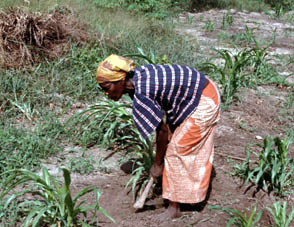 |
Historically, men did the weaving, wood carving, tapping, hunting and fishing. There is little hunting left now; only small game such as deer and grasscutters. The last known elephant in Kwawu was seen around 1910, although the Kwawu were renowned for elephant hunting and the meat.
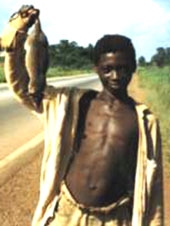 |
Grasscutter for Sale on Roadside
Fishing continues along the coast but that does not usually involve Kwawu, and the international rape of the international fisheries is currently causing a rapid decline in that. Some small fish live in the local rivers in Kwawu, but are usually the prey only of boys. Fish traps are set in the Volta Lake on the Afram Plains.
I have briefly met the occasional hunter, with his gun and dogs, but did not get an opportunity to travel through the bush to watch hunting first hand.
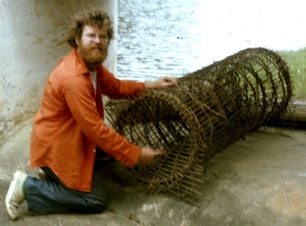 |
Fresh Water Fish Trap
The weaving of the beautiful kente cloth is done by men. The 1960 census, one of the best ever made, shows 100 per cet of kente weavers in the whole country were male. While this has transferred into modern work such as tailoring and embroidery, done by men for male customers, there have been many small schools and some missionary and Governmentally based training institutes teaching girls to be seamstresses. The women who sew usually do so for female customers.
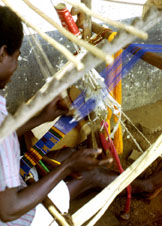 |
Working in wood is seen as men's work . Historically this included the carving of important items, including mortars and pestles for pounding fufu, making of wooden spiritual items such as akuaba dolls, and stool carving for elders and chiefs. Most ceremonial drumming is done by men. Drum making, similarly, like black smithing, is seen as a male occupation. In several other parts of Africa, the blacksmith is seen as special, sometimes treated as an untouchable, other times as being semi sacred. Not so among the Akan.
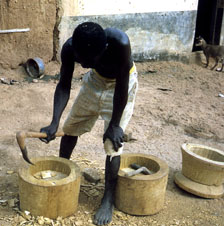 |
Wood Carver
In more modern times, men have tended to dominate in the automobile repair industry, small appliance repairs, vehicle driving, carpentry, masonry and plumbing. . Much of that has been due to the nineteenth century choices of practical occupations by the Swiss missionaries. They would not train girls to be plumbers or carpenters. . A few Government training institutions have recently been turning out female graduates for jobs formerly seen as only for men.
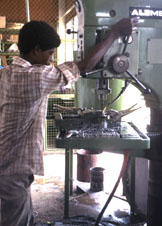 |
While small peasant farming is done by women, the state farms (during the Nkrumah era, 1957 - 1966) hired men to drive tractors. . The jobs of common labourers, however, tended to be filled by northerners, traditionally seen as "slaves" by the Akan. Similarly, when men are listed as "farmers" they tended to be farm managers and entrepreneurs, developed and worked the cocoa industry, and hired northerners as labourers.
The oil palm tree is a special case. While it is being farmed, and used as a source of food from the palm kernel, it is seen as women's' work, and is normally owned by a women. When it grows too high for her to harvest the kernels, she sells it to a man who fells it and taps the sap in the trunk to make palm wine. Since the palm kernels are red, and the wine is white, it easily falls into the cosmography of the three colours, described in Three Souls. See Abe (Palm).
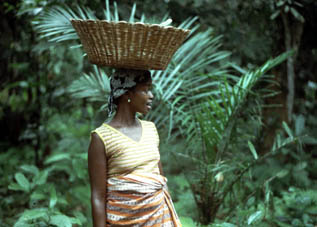 |
Oil Palm Farmer
Both men and women can be chiefs and elders (see ancestors) and both men and women can become priests of the tutelary Deities (see gods). The majority of elders and chiefs (about nine out of ten) are men, and that is explained by the prohibition against women in their menstrual periods entering the sacred stool rooms. The majority of akomfo (possessed persons) are women (about eight out of ten), even though it is equally forbidden for a menstruating woman to enter the shrine rooms of local gods. Generally there is a higher proportion of men in those offices which command more prestige and power.
- Gender Hub
- Gender Introduction
- Gender Commensality ; Gender II
- Women I; Food
- Women II; Farming
- Women III (1): Cooking
- Women III (2): Cooking 2
- Women IV: Marketing
- Women V: Clay
- Men I: Wood
- Men II: Weaving
- Men III: Hunting
- Men IV: (1) Transport
- Men IV: (2) Transport
- Men and Women; (1) Oil Palm; Introduction
- Men and Women; (2) Oil Palm; Farming, Oil
- Men and Women; (3) Oil Palm; Wine Tapping
- Men and Women; (4) Oil Palm; Wine Marketting
- Men and Women; (5) Oil Palm; Other Products
- Men and Women; (1) Oil Palm; Conclusion